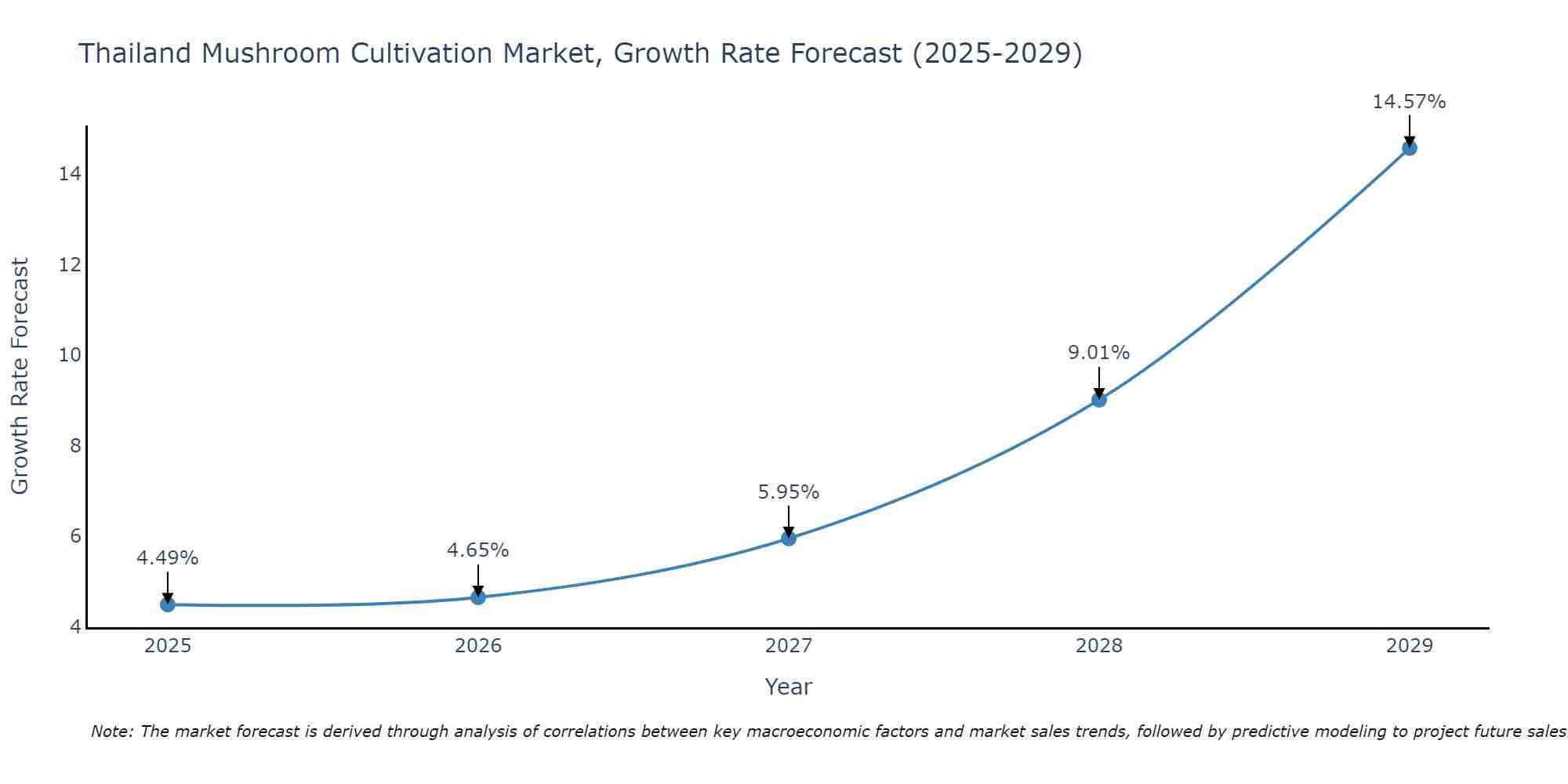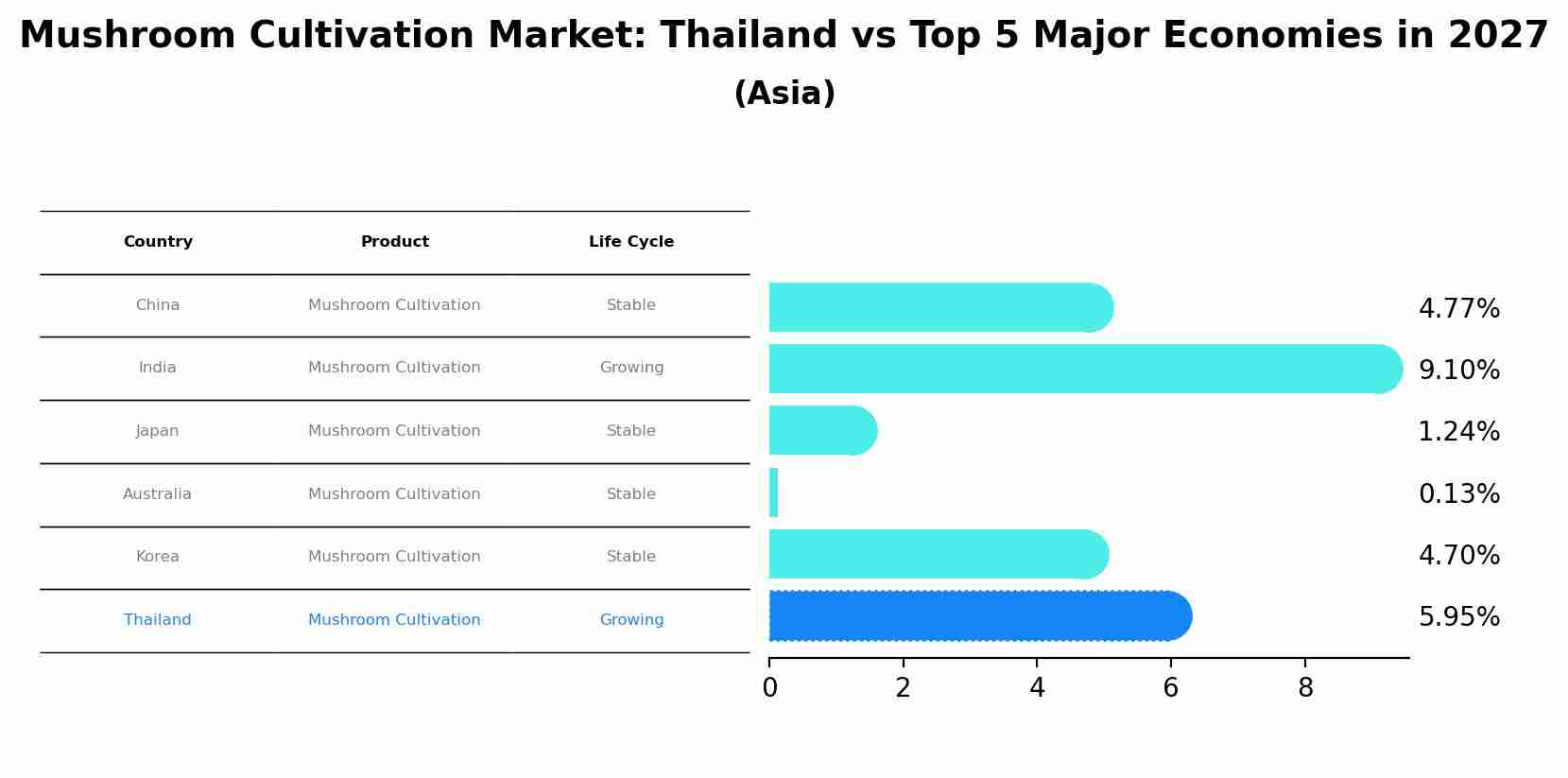Thailand Mushroom Cultivation Market (2025-2031) Outlook | Analysis, Share, Revenue, Size, Trends, Industry, Companies, Growth, Forecast & Value
| Product Code: ETC383125 | Publication Date: Aug 2022 | Updated Date: Apr 2025 | Product Type: Market Research Report | |
| Publisher: 6Wresearch | Author: Ravi Bhandari | No. of Pages: 75 | No. of Figures: 35 | No. of Tables: 20 |
Thailand Mushroom Cultivation Market Size Growth Rate
The Thailand Mushroom Cultivation Market is likely to experience consistent growth rate gains over the period 2025 to 2029. From 4.49% in 2025, the growth rate steadily ascends to 14.57% in 2029.

Mushroom Cultivation Market: Thailand vs Top 5 Major Economies in 2027 (Asia)
By 2027, Thailand's Mushroom Cultivation market is forecasted to achieve a growing growth rate of 5.95%, with China leading the Asia region, followed by India, Japan, Australia and South Korea.

Thailand Mushroom Cultivation Market Synopsis
The mushroom cultivation market in Thailand is experiencing steady growth due to increased awareness of the health benefits and culinary versatility of mushrooms. Local farmers are cultivating a variety of mushroom species, including shiitake, oyster, and button mushrooms. These mushrooms are not only sold domestically but also exported to neighboring countries, making Thailand a competitive player in the regional mushroom market.
Drivers of the Market
The mushroom cultivation market in Thailand is thriving due to various factors, with the rising awareness of the nutritional benefits of mushrooms being a primary driver. Mushrooms are gaining popularity as a healthy and versatile food ingredient, contributing to increased demand. Thailand favorable climate and agricultural conditions are conducive to mushroom cultivation, making it a viable and profitable venture for farmers. Moreover, government support and initiatives promoting agricultural diversification encourage more farmers to enter the mushroom cultivation sector. The market is also benefiting from the increasing demand for exotic and specialty mushrooms, both domestically and for export. Additionally, the sustainability and eco-friendly nature of mushroom farming align with current consumer preferences for environmentally responsible food sources.
Challenges of the Market
The mushroom cultivation market in Thailand faces challenges related to the need for specialized knowledge and technology. Successful mushroom cultivation requires expertise in mushroom biology and climate control. Market players must also manage issues like disease prevention and consistent quality. Competition from imported mushrooms can be fierce, requiring local growers to differentiate their products and emphasize quality.
COVID-19 Impact on the Market
The COVID-19 pandemic had a mixed impact on the Thailand mushroom cultivation market. While there was increased interest in home gardening and mushroom cultivation, disruptions in the supply chain affected the availability of mushroom spawn and equipment. Some businesses pivoted to online sales and educational resources to cater to home growers. The market is expected to continue growing as consumers remain interested in sustainable and locally sourced food options.
Key Players in the Market
The Thailand mushroom cultivation market is seeing steady growth, with several leading players contributing to its development. One notable company in this sector is Mycotech Group, which specializes in mushroom cultivation and innovative mycelium-based products. Thai Agri Foods Public Company Limited is another key player involved in mushroom production and distribution. Their brands like "Thai Agri Fresh" are well-known for quality mushrooms. Furthermore, Thai Edible Fungi Co., Ltd., a subsidiary of Saha Pathanapibul Public Company Limited, has made significant strides in mushroom cultivation. These companies have been at the forefront of Thailand efforts to promote mushroom cultivation and consumption.
Key Highlights of the Report:
- Thailand Mushroom Cultivation Market Outlook
- Market Size of Thailand Mushroom Cultivation Market, 2024
- Forecast of Thailand Mushroom Cultivation Market, 2031
- Historical Data and Forecast of Thailand Mushroom Cultivation Revenues & Volume for the Period 2021-2031
- Thailand Mushroom Cultivation Market Trend Evolution
- Thailand Mushroom Cultivation Market Drivers and Challenges
- Thailand Mushroom Cultivation Price Trends
- Thailand Mushroom Cultivation Porter's Five Forces
- Thailand Mushroom Cultivation Industry Life Cycle
- Historical Data and Forecast of Thailand Mushroom Cultivation Market Revenues & Volume By Type for the Period 2021-2031
- Historical Data and Forecast of Thailand Mushroom Cultivation Market Revenues & Volume By Button Mushroom for the Period 2021-2031
- Historical Data and Forecast of Thailand Mushroom Cultivation Market Revenues & Volume By Oyster Mushroom for the Period 2021-2031
- Historical Data and Forecast of Thailand Mushroom Cultivation Market Revenues & Volume By Shiitake Mushroom for the Period 2021-2031
- Historical Data and Forecast of Thailand Mushroom Cultivation Market Revenues & Volume By Others for the Period 2021-2031
- Thailand Mushroom Cultivation Import Export Trade Statistics
- Market Opportunity Assessment By Type
- Thailand Mushroom Cultivation Top Companies Market Share
- Thailand Mushroom Cultivation Competitive Benchmarking By Technical and Operational Parameters
- Thailand Mushroom Cultivation Company Profiles
- Thailand Mushroom Cultivation Key Strategic Recommendations
Frequently Asked Questions About the Market Study (FAQs):
- Single User License$ 1,995
- Department License$ 2,400
- Site License$ 3,120
- Global License$ 3,795
Search
Thought Leadership and Analyst Meet
Our Clients
Related Reports
- Afghanistan Apparel Market (2026-2032) | Growth, Outlook, Industry, Segmentation, Forecast, Size, Companies, Trends, Value, Share, Analysis & Revenue
- Canada Oil and Gas Market (2026-2032) | Share, Segmentation, Value, Industry, Trends, Forecast, Analysis, Size & Revenue, Growth, Competitive Landscape, Outlook, Companies
- Germany Breakfast Food Market (2026-2032) | Industry, Share, Growth, Size, Companies, Value, Analysis, Revenue, Trends, Forecast & Outlook
- Australia Briquette Market (2025-2031) | Growth, Size, Revenue, Forecast, Analysis, Trends, Value, Share, Industry & Companies
- Vietnam System Integrator Market (2025-2031) | Size, Companies, Analysis, Industry, Value, Forecast, Growth, Trends, Revenue & Share
- ASEAN and Thailand Brain Health Supplements Market (2025-2031) | Strategy, Consumer Insights, Analysis, Investment Trends, Opportunities, Growth, Size, Share, Industry, Revenue, Segments, Value, Segmentation, Supply, Forecast, Restraints, Outlook, Competition, Drivers, Trends, Demand, Pricing Analysis, Competitive, Strategic Insights, Companies, Challenges
- ASEAN Bearings Market (2025-2031) | Strategy, Consumer Insights, Analysis, Investment Trends, Opportunities, Growth, Size, Share, Industry, Revenue, Segments, Value, Segmentation, Supply, Forecast, Restraints, Outlook, Competition, Drivers, Trends, Demand, Pricing Analysis, Competitive, Strategic Insights, Companies, Challenges
- Europe Flooring Market (2025-2031) | Outlook, Share, Industry, Trends, Forecast, Companies, Revenue, Size, Analysis, Growth & Value
- Saudi Arabia Manlift Market (2025-2031) | Outlook, Size, Growth, Trends, Companies, Industry, Revenue, Value, Share, Forecast & Analysis
- Uganda Excavator, Crane, and Wheel Loaders Market (2025-2031) | Strategy, Consumer Insights, Analysis, Investment Trends, Opportunities, Growth, Size, Share, Industry, Revenue, Segments, Value, Segmentation, Supply, Forecast, Restraints, Outlook, Competition, Drivers, Trends, Demand, Pricing Analysis, Competitive, Strategic Insights, Companies, Challenges
Industry Events and Analyst Meet
Whitepaper
- Middle East & Africa Commercial Security Market Click here to view more.
- Middle East & Africa Fire Safety Systems & Equipment Market Click here to view more.
- GCC Drone Market Click here to view more.
- Middle East Lighting Fixture Market Click here to view more.
- GCC Physical & Perimeter Security Market Click here to view more.
6WResearch In News
- Doha a strategic location for EV manufacturing hub: IPA Qatar
- Demand for luxury TVs surging in the GCC, says Samsung
- Empowering Growth: The Thriving Journey of Bangladesh’s Cable Industry
- Demand for luxury TVs surging in the GCC, says Samsung
- Video call with a traditional healer? Once unthinkable, it’s now common in South Africa
- Intelligent Buildings To Smooth GCC’s Path To Net Zero


















